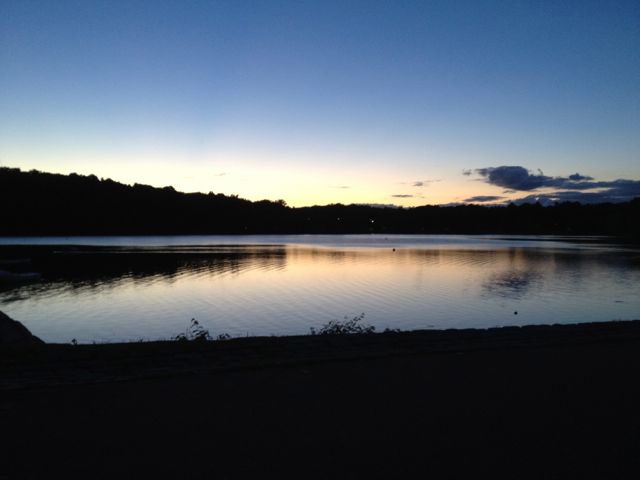The other day I sat in the car as my toddler napped, just before I dropped him off at school. As he gently snored, a truck pulled up near us with its windows down, blasting music. Thankfully it didn’t wake up my son, but I wondered if the other driver was conscious of his inconsideration.
It’s hard to find silence in modern life. Despite people having headphones and living in sonic bubbles, I still encounter people who feel it’s okay to play their music out loud for all to hear on the subway, walking down the street, or worse—on a quiet hiking trail. Those whose quiet space is interrupted by sound have no choice. They are subjected to the offender’s assumption that the default is noise rather than quiet.
 More and more the default is noise. The U.S. Department of Transportation reports that 97% of Americans are exposed to aviation and highway noise. Our digital age has left us to endure dings, beeps, chimes, and alarms—on our phones, tablets, computers, cars, and appliances. It seems that silence has become a privilege, accessible to the few who can live in remote areas, large gated off properties, or those who can afford to make a retreat.
More and more the default is noise. The U.S. Department of Transportation reports that 97% of Americans are exposed to aviation and highway noise. Our digital age has left us to endure dings, beeps, chimes, and alarms—on our phones, tablets, computers, cars, and appliances. It seems that silence has become a privilege, accessible to the few who can live in remote areas, large gated off properties, or those who can afford to make a retreat.
Consider those who live in cities or crowded spaces. Noise maps of cities often correlate with neighborhood income levels, noisier areas typically being underserved communities. In fact there’s a rise in “silence gentrification”, where property values are at risk of being driven up in quieter areas, displacing long-term residents.
As one who makes an annual silent retreat, I know the value of silence. And as I get older, I appreciate it more and more. For some, including those who go on a silent retreat, there is a fear of the quiet because it is so foreign to our modern life. Yet when we reduce not just the auditory noise, but the noise of distraction, we discover the inner self. The inner silence gives way to a deeper awareness of God-within. Consider Jesus’ efforts to retreat to quiet places to pray (cf. Mark 1:35), and how Elijah discovered God in the whisper of a “still small voice”, which one translation calls “sheer silence” (1 Kings 19:11-13, NRSV).
The Benefits of Silence
If silence helps us listen more closely to the voice of God, then silence is necessary for good discernment. Discernment, at its core, means to listen deeply – to ourselves, to others, and to God. In the noise of our daily lives, it becomes challenging to hear these subtle voices. Silence creates the space necessary for true discernment. It allows us to quiet our minds, set aside distractions, and attune ourselves to the gentle nudges of the Spirit.
For those who crave quiet spaces, some turn to noise cancelling headphones or sensory deprivation chambers, ironically using technology to artificially block out unwanted sound.
 But it’s no surprise. Studies have shown the benefits of silence for mental health. Silence can make people more peaceful. Organisations around the world are working on initiatives to improve access to quiet spaces. Quiet Parks International works with communities and land managers to preserve quiet spaces, which they call “endangered”. Their mission is to “save quiet for the benefit of all life”. And in Sweden, 41% of municipalities include quiet areas in their general plans.
But it’s no surprise. Studies have shown the benefits of silence for mental health. Silence can make people more peaceful. Organisations around the world are working on initiatives to improve access to quiet spaces. Quiet Parks International works with communities and land managers to preserve quiet spaces, which they call “endangered”. Their mission is to “save quiet for the benefit of all life”. And in Sweden, 41% of municipalities include quiet areas in their general plans.
A Right
I think we ought to think of silence not only as a spiritual “perk” that we can only find on retreat or in the country, but a right, a public good that needs protection. How can we balance appropriate music played in public with people’s right to quiet? As a member of a community you can educate others about the benefits of silence and quiet or advocate for quiet hours in your neighbourhood. You might also support local initiatives for creating or preserving quiet spaces, and even be mindful of your own noise contributions.
As individuals we can cultivate silence in our daily lives through intentional practices and rituals:
- Create a designated quiet space in your home for prayer and reading
- Practice “tech-free” times during the day
- Take short “silence breaks” throughout your workday
- Use noise-cancelling headphones when in noisy environments
- Wake up earlier to enjoy quiet mornings
- Take regular nature walks in quiet areas
- Have a silent meal once a week
- Make periodic silent retreats at home or at a retreat center
In a world increasingly filled with noise, seeking and preserving silence is not just a luxury, but a necessity for our spiritual, mental, and societal well-being. It is a resource under threat, one that we must actively protect and cultivate. By incorporating moments of silence into our daily lives and advocating for quiet spaces in our communities, we can create oases of peace in our noisy world. And let us follow the wisdom of the psalmist who says, “Be still, and know that I am God.” (Psalm 46:10).
Listen to the On Point podcast episode, “Can we save the quietest places in the world?” which features Quiet Parks International.
Related posts:
Listen to the podcast version of this post…









I learned long ago that having a hearing disability is an advantage in our noisy world. I just have to take off my hearing aids to turn down the world. 😁